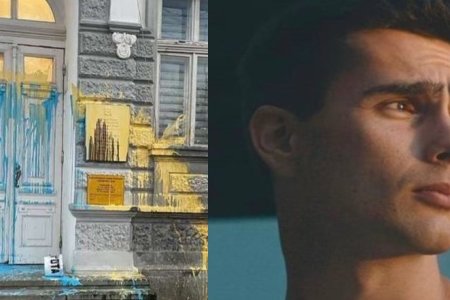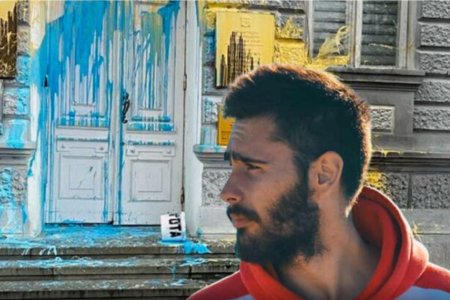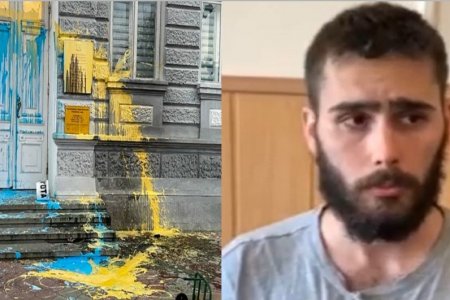
Bohdan Ziza (Azizov), a street artist and activist from Yevpatoria (Crimea) is turning 30 on 23 November 2024, his third birthday in Russian captivity. If the current Russian regime is allowed its way, Bohdan will remain imprisoned until he is 42, in savage reprisal for his protest against Russia’s full-scale invasion of Ukraine.
Ziza has been imprisoned since his protest at 4 a.m. on 16 May 2022. On that fateful morning, Ziza splashed paint in the blue and yellow colours of Ukraine’s flag over the entrance to the occupation administration building in Yevpatoria. The protest was certainly not entirely innocent, as he did also throw two Molotov cocktails, but this was certainly not an act of ‘terrorism’. Ziza has since explained that the petrol bombs were basically just to give more impact to the video clip that he was making of the protest. This was not, he has said, his first protest, and he had earlier carried out what he termed ‘acts of political vandalism’ at night. He had known that he might be detained, but clearly failed to understand the danger at a time when Russia’s FSB were regularly fabricating ‘terrorism’ cases out of nothing in order to present Ukrainians as ‘terrorists’ or ‘saboteurs’. It was a tragic mistake, especially given that Russia had used similar methods back in 2014 for its show trial of Ukrainian film director Oleh Sentsov and three other opponents of Russia’s invasion. Then also a very minor Molotov cocktail incident which would normally have prompted no more than vandalism charges, was treated as ‘terrorism’.
It was, in fact, very clearly the purpose behind Ziza’s actions, which he spelled out in a video, that spurred the ferocity of the repression meted out. In its statement, declaring Bohdan Ziza a political prisoner, the Memorial Support for Political Prisoners Project describes in detail Ziza’s act of protest. The young artist had filmed the protest on his mobile home and then prepared a video, accompanied by his commentary, which he posted on a new Instagram page. The accompanying text called on “all members of the graffiti culture, all vandals in Crimea, in Russia and Belarus”. He remained them that such a graffiti culture was, in the first instance, protest and that there was no better time to express this than now.
“A terrible war is underway, unleashed by Putin. The state machine, propaganda are trying to convince the people that this is normal. They are trying to convince them that they don’t need to do anything, just sit silently, observe and wait, that nobody can do anything. However it is now very important to come out on to the street and express your protest, so that those who are against this war, who are sitting at home, afraid to express their opinion, see that they are not alone. There are many of us. And there are more of us than of those who support this war. They have taken away the possibility of coming out in the day, but we can come out at night. I call on all to come out at night and express your protest. Vandalism can be for the good and this is precisely such an occasion. No to the war.”
It was this address that was used to prompt the charges of threatening to carry out an act of terrorism (because he called this “the first warning”); of ‘public calls to terrorist activities’
Although in custody since 16 May 2022, it was only after the FSB had used torture to extract a ‘confession’ (in fact, multiple ‘alternative confessions’) that they admitted to his seizure and the was officially remanded in custody.
Ziza was initially fined under one of the charges rushed into legislation after Russia’s full-scale invasion (‘discrediting the Russian army]), but he was not released from SIZO [the remand prison]. Soon afterwards very serious charges were laid, with Ziza accused of: ‘an act of terrorism (Article 205 § 1 of Russia’s criminal code); the threat to carry out such a supposed act of terrorism (under the same article); public calls to terrorism (Article 205.2 § 2) and vandalism prompted by political enmity (Article 214 § 2).
During his final address to the Southern District Military Court in Rostov (Russia), Ziza said that he regretted that his elderly grandmother, who had brought him up and now needs his help, would be left alone. He had, however, acted in accordance with his conscience. He was a Ukrainian, he said, and it caused him pain to see what was happening to his country. He acknowledged that his protest had been foolish, and that he should have expressed his views in a different way but rejected the ’terrorism’ charges and asked if his protest really warranted the 18-year sentence demanded by the Russian prosecutor. “Russian law gives shorter sentences even for murder, and I spoke out against murder.”
“I am also an ordinary citizen of my country, but of Ukraine, and who is not accustomed to be silent in the face of lawlessness. I am not alone in this ‘aquarium’ [the effectively cage that he is held in] today. There are over 200 people with me. These are Ukrainian political prisoners held in Russian prisons on fabricated charges. Many of them are Crimean Tatars who have yet again faced Russian repression. I am myself half Crimean Tatar and it is painful to see what is happening to our people.”
Russia’s Southern District Military Court has been handing down huge sentences against Crimean Tatar and other Ukrainian political prisoners since 2014, and both the prosecutor, Vladislav Kuznetsov, who demanded an 18-year sentence, and presiding ‘judge’ Roman Plisko have taken part in many other political trials. On 6 June 2023, a panel of ‘judges’ under Plisko found Ziza ‘guilty’ of all four charges and sentenced him to 15 years’ harsh-regime (maximum-security) imprisonment, with the first four years to be in a prison, the worst of Russia’s penal institutions.
This sentence was, predictably, upheld on 27 September 2023 by a panel of ‘judges’, under Maksym Panin from the Military court of appeal in Vlasikha (Moscow region).
It seemed clear from when Ziza’s videoed ‘confession’ and ‘apology’ were shown that he had given them under duress. The language in it, and especially his use of the Russian euphemism for its full-scale invasion of Ukraine [‘special military operation’] were totally out of character. He has since confirmed that the ‘confession’ was obtained through torture, and that he had been forced to make at least five such videos. One ended up in the media, another in the file material, while several were rejected. He said that the FSB don’t stop at anything, with virtually every political prisoner subjected to beatings and torture.
The first video he was forced into making was sent to somebody who demanded that he do it again as he didn’t seem to be sincerely ‘repenting’. “I deliberately showed no emotion, so they beat me again. I’m not a very good actor and, in addition, the text kept changing. First, I had to apologize to the Russian army, then to Putin.” He adds that, in the end, even they understood that the apology to Putin was excessive.


